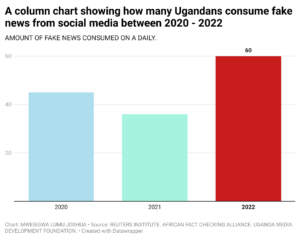Stating the Claim
A Facebook post claimed that the front page of the “Bukedde” newspaper, a popular vernacular daily in Uganda, depicted satirical and false information about various trending topics, including misleading captions and images.
Background Information and Context
Fact-checking involves verifying information to ensure its accuracy and truthfulness in journalism. This process includes examining facts, statements, and claims, analyzing the credibility of sources, and drawing conclusions on the quality of content. In Uganda, spreading false information with malicious intent is a criminal offense. The Penal Code Act sections 39 and 40 explicitly prohibit seditious intentions and the dissemination of seditious materials, aiming to prevent hatred or disaffection against the government and its institutions.
statements, and claims, analyzing the credibility of sources, and drawing conclusions on the quality of content. In Uganda, spreading false information with malicious intent is a criminal offense. The Penal Code Act sections 39 and 40 explicitly prohibit seditious intentions and the dissemination of seditious materials, aiming to prevent hatred or disaffection against the government and its institutions.
With a significant portion of Ugandans relying on social media for news—45% according to a 2020 Reuters Institute survey—and 36% encountering false information (African Fact-Checking Alliance, 2021), the role of fact-checkers is crucial in maintaining the integrity of information. The Uganda Media Development Foundation’s 2022 study indicated that 60% of Ugandans viewed social media as a primary information source, highlighting the potential for misinformation to spread rapidly.
Verification Process and Evidence Against the Claim
 The Facebook post in question depicted an image allegedly from the front page of “Bukedde,” with captions and images merged to create a misleading narrative. One such image showed Ugandan journalist Samson Kasumba with a caption falsely attributing expert opinions on accident aftermaths to him.
The Facebook post in question depicted an image allegedly from the front page of “Bukedde,” with captions and images merged to create a misleading narrative. One such image showed Ugandan journalist Samson Kasumba with a caption falsely attributing expert opinions on accident aftermaths to him.
Upon using fact-checking tools, it was confirmed that this content was fabricated and humorous in nature, with no basis in reality. The verified Facebook page of “New Vision,” the media company publishing “Bukedde,” clarified the misinformation by presenting the correct front page of the daily and flagging the post as fake.
Implication to the General Community
The rapid spread of misinformation on social networks has significant implications. Misleading content can influence public opinion, create unnecessary panic, and damage reputations. Historical instances, such as exaggerated reports during the November 2021 Kampala bombings or the false claims about Kale Kayihura’s ( former IGP) arrest, illustrate the potential harm of unchecked fake news. Even high-profile figures, such as President Yoweri Museveni, have been subjected to baseless rumors, underscoring the need for rigorous fact-checking.
The consequences of spreading false information can be severe. Edward Awebwa, a TikTok influencer, was sentenced to six years in prison for maliciously spreading false information, illustrating the legal and personal risks associated with fake news.
Conclusion and Verdict
To prevent the defamation of character, instillation of fear, and other societal harms caused by fake news, journalists and media professionals must commit to accurate reporting. By acting as ambassadors of truth and combating the spread of misinformation, they can foster a well-informed society and maintain public trust in the media.
In conclusion, the Facebook post alleging a misleading front page of “Bukedde” was thoroughly debunked through diligent fact-checking. The verified evidence and clarifications provided by “New Vision” reaffirm the importance of fact-checking in safeguarding journalistic integrity and public confidence.




